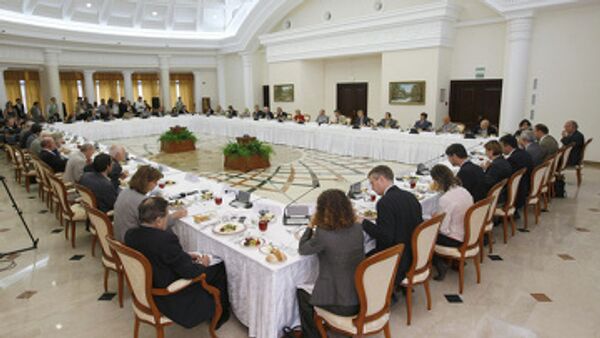MOSCOW.(RIA Novosti political commentator Dmitry Kosyrev) - The two-day meeting of the Valdai Club took place far away from Moscow, in Yakutia. As a joint project of the Council for Foreign and Defense Policy and RIA Novosti, since 2004, brainstorming sessions between Western experts on Russia and their Russian colleagues have been held every year in early September in various Russian cities.
It has been obvious for several years now that what is said at the Valdai meeting is later reflected in one form or another in the relations between Russia and the West. In fact, Valdai brings together the advisers to the heads of state and government on precisely this sensitive issue.
Judging from this meeting, what can Moscow expect from America and Europe in the coming year? The answer is: nothing special one way or the other. A hiatus.
The conference included four sessions roughly devoted to the following topics: is there still a Cold War? Do new challenges bring Russia and the West closer together or divide them? Has the "reset" button in Russian-American relations worked, and how should the European security architecture change?
Despite the diversity of opinion, the consensus was that there is no Cold War, but just a half-hearted slanging match, owing more to habit than anything else. The reason is that the parties forgot to mark the end of that war by signing a peace treaty. Each side considers itself to be the winner, which has bred a lot of ire, misunderstanding and mutual annoyance. But what is being done towards that end, i.e. towards working out a peace treaty? If anything is being done at all, it is being done by the U.S. and Russia, and very cautiously at that. There is no movement in the European theatre. The Europeans, though not very happy with the current situation, are not ready to do anything to change it.
Valdai Club rules forbid quoting the speakers directly. But then what was said is more important than who said it. Even more important is what has not been said. Almost nothing was said about last-year's war with Georgia, or even about Ukraine. Almost nothing was said about Moscow's recognition of Abkhazia and South Ossetia. That's a thing of the past, as everybody here understands.
As for the "reset" of the relations with the U.S., the pro-Republican guests issued a warning: if you get everything you want from Obama without giving anything in return, then we will be back in power and will "reset" the relations back. People who are closer to Obama were sending basically the same message, only more gently.
What else was said that merits attention? There was an attempt to explain away Europe's lukewarm attitude to Russian initiatives: "The West will see how things shape up in Russia and whether it will grow stronger or weaker." If Russia emerges enfeebled from the crisis, it will agree to any terms. If it emerges stronger... Well, there is clearly a lack of imagination on this topic, probably because this outcome is thought to be unlikely. "Russian leadership's emotional rhetoric on these issues is counterproductive." In other words, it is futile to exhort and shame the Europeans. By the way, the same is true of the relationship with the U.S., in which both sides have so far studiously avoided discussing the key irritating factors.
On the subject of irritating factors, at least two people, a Frenchman and a Russian, suggested that talk about democracy should be dropped from the list of discussion points for a long time in order to prevent the gulf between the two sides widening. In general, the West has been trying a bit too hard to promote democracy (not only in Russia and its neighbours), mirroring Comintern's subversive methods between the two world wars, and running into basically the same problems that proved to be the undoing of the Comintern.
There was a lot of pessimism about the future. First, the Unites States, Europe and indeed Russia see their influence waning. Second, we all think in terms of states, whereas we see a "growing confrontation of non-state forces, so that state borders are not as important as before, and the challenge is to stop the new realities from leading to war."
And finally, the Club enjoyed Yakutia. The Republic's leadership organised a boat cruise to the Lena pillars, which were magnificent, and a visit to an ice cave. No mammoths, alive or dead, were encountered. In addition, the guests found out that the permafrost-bound Yakutia is not overly worried about global warming - or at least not yet.
The opinions expressed in this article are the author's and do not necessarily coincide with those of RIA Novosti.

